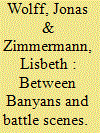|
|
|
Sort Order |
|
|
|
Items / Page
|
|
|
|
|
|
|
| Srl | Item |
| 1 |
ID:
145513


|
|
|
|
|
| Summary/Abstract |
In studying the global spread and implementation of liberal norms, scholars have moved from linear notions of norm diffusion and promotion to an emphasis on norm contestation. Contestation by the supposed beneficiaries and addressees has taken centre stage in both research on the norms that underpin global governance and in studies on democracy promotion and liberal peacebuilding. While the impetus of this scholarship is normative – to overcome the taken-for-granted nature of liberal norms – the concept of contestation itself is mainly used with an analytical interest. Yet, as we show in this article, contestation also comes with – oftentimes implicit – normative connotations. Focusing on the seminal work of Milja Kurki, Oliver Richmond, Antje Wiener, and Amitav Acharya, we reconstruct these normative connotations. It turns out that the normative take on contestation is fairly conventional in all four approaches. Contestation is largely seen as a means to enable dialogue, as illustrated by Acharya’s metaphor of the Banyan tree. Fundamental conflicts over liberal norms (‘battle scenes’) are either not considered or seen as normatively undesirable. As a way forward, we propose a typology that enables scholars to empirically analyse contestation in its different expressions and suggest two strategies to normatively assess practices of contestation.
|
|
|
|
|
|
|
|
|
|
|
|
|
|
|
|
| 2 |
ID:
152082


|
|
|
|
|
| Summary/Abstract |
Since 2009 the USA and the Bolivian government have been trying to fix their broken diplomatic relations. These negotiations culminated in 2011 in the signing of a bilateral agreement but, ultimately, failed to establish a basis for mutually acceptable development aid relations. This article analyses these negotiations and suggests a partial explanation that accounts for their dynamics and results. Specifically it shows how the negotiations have pitted Bolivian demands for state sovereignty and mutual respect, based on an egalitarian understanding of inter-state relations, against the US emphasis on common obligations and universal rights, informed by a non-egalitarian notion of liberal hegemony.
|
|
|
|
|
|
|
|
|
|
|
|
|
|
|
|
| 3 |
ID:
104026


|
|
|
|
|
| Publication |
2011.
|
| Summary/Abstract |
A few years ago, it was a common complaint that the international dimension of democratization and, in particular, the external promotion of democracy were largely neglected by scholars of comparative politics and international relations. By now, academic research has begun to catch up with the growth of foreign and development policies explicitly aiming at the international promotion and protection of democratic regimes. Yet, what is still a largely unexplored desideratum is the challenge to theoretically grasp 'democracy promotion' as an aim and strategy of democratic foreign policies - that is, to embed the empirical research on democracy promotion in theoretical perspectives on international relations. This article sets out to contribute to filling this gap by developing a classification of competing theoretical approaches. First, research on the democratic peace - the one major research program concerned with democratic foreign policy - is used to derive potential motives behind the promotion of democracy. Then, on this basis, existing theories of international relations are modified in order to locate democracy promotion within the foreign policy of democratic states. In conclusion, the article presents four sketches of potential theoretical approaches to the external promotion of democracy.
|
|
|
|
|
|
|
|
|
|
|
|
|
|
|
|
|
|
|
|
|